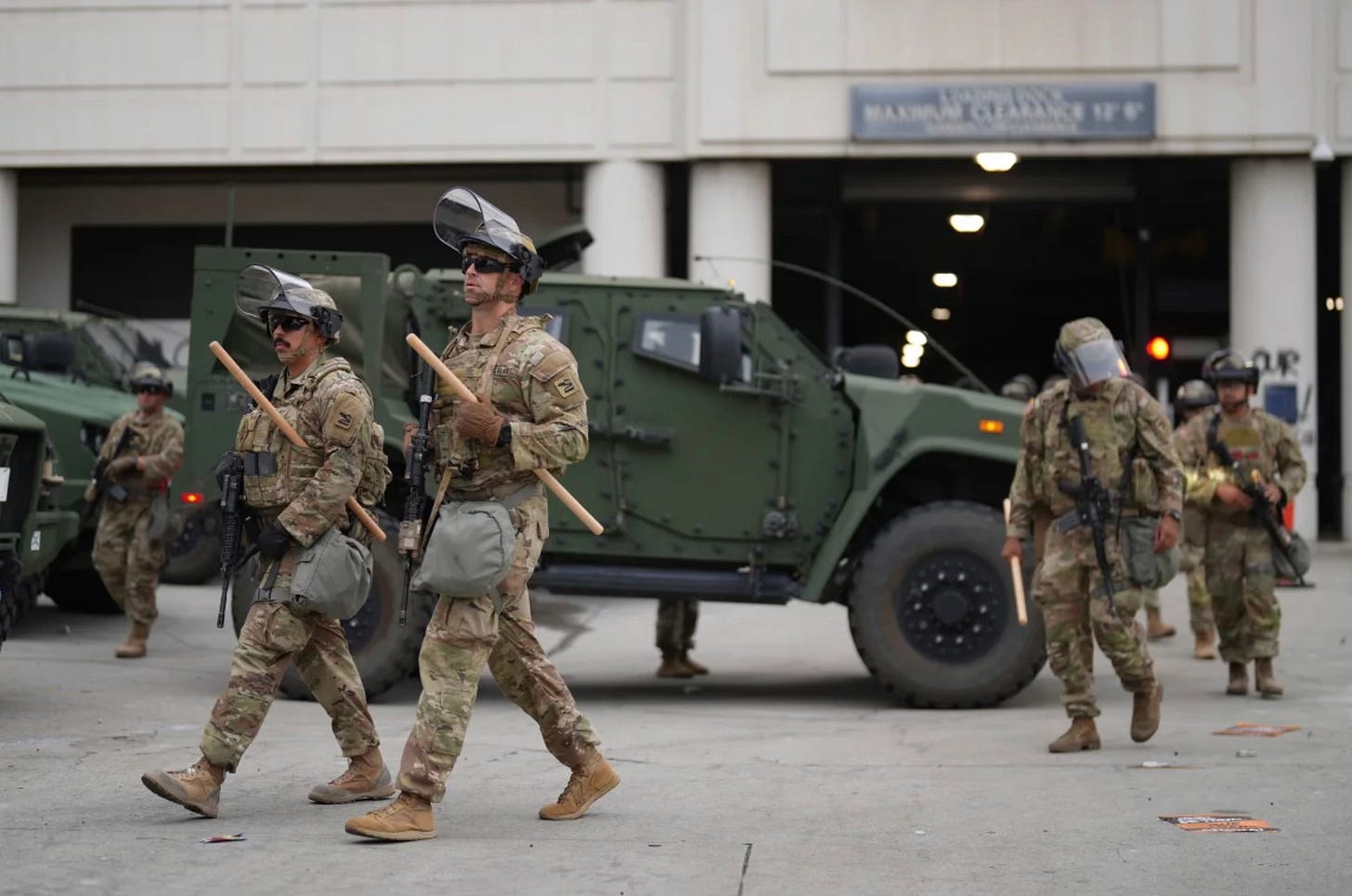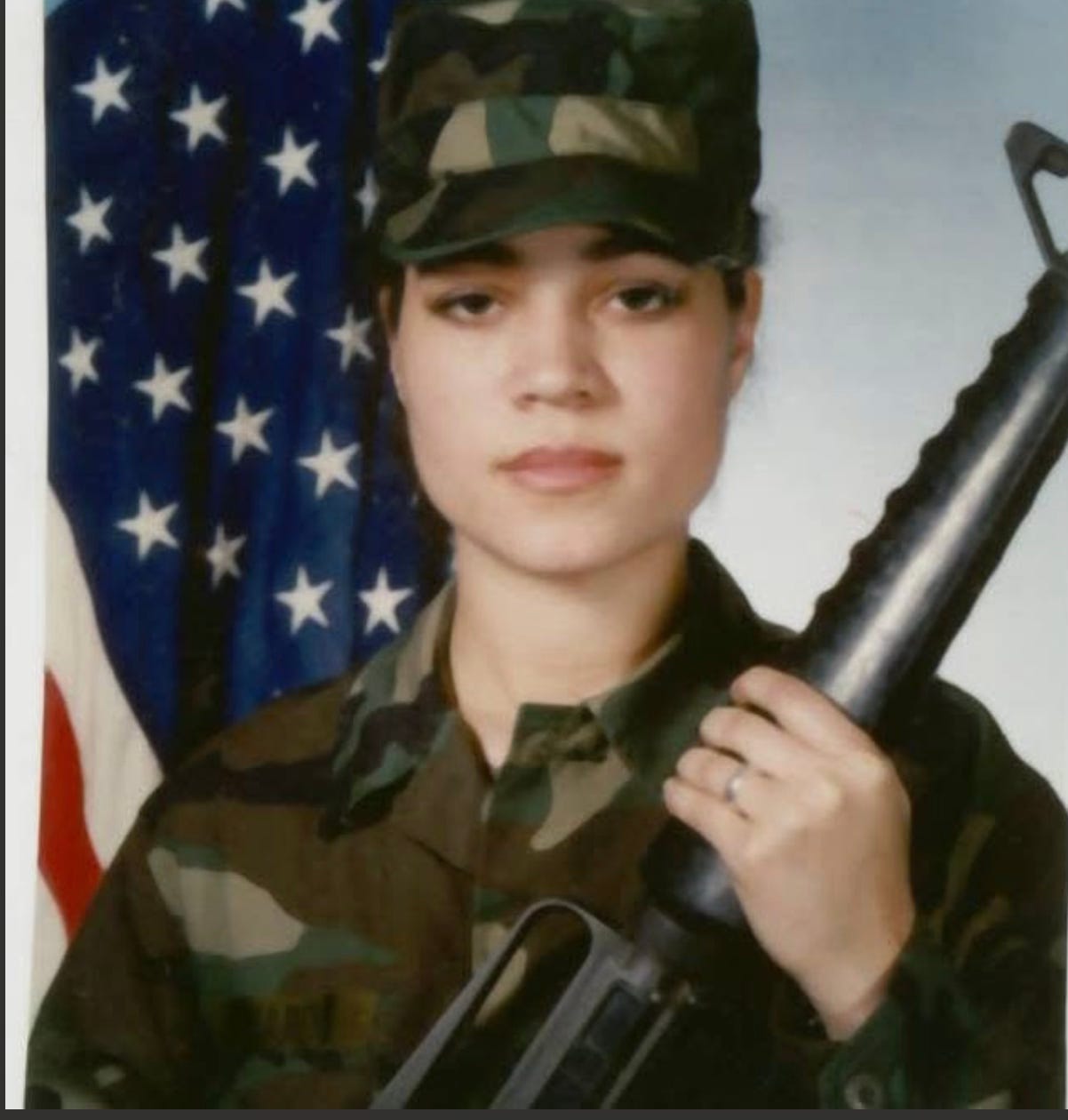This is Emily Writes Back, a newsletter for brilliant people, by Emily Sanders Hopkins.
Photo of National Guard troops in Los Angelos this week, by Eric Thayer for the AP
I wonder how the guardsmen deployed are feeling and what they’re thinking? The men in this photo appear to be in their mid 20’s to mid 30’s.
The distinction between protecting little children as they bravely integrate a public school and whatever the National Guard is being deployed to do in Los Angelos is germane. Protecting citizens’ rights versus protecting a police state from lawful protest. Protecting rights versus quashing rights.
But it’s very difficult to question or disobey “orders” when you are in a system that reveres obedience and hierarchy … and force.
As a teenager, I joined the Army for something better to do than wait tables at a Shoney’s in West Virginia. I was a college dropout who was not that great at waiting tables, judging by the piddly tips the retirees and Mennonites and highway travelers left me. With a base pay of around $2 an hour, my take-home at the end of a week wasn’t even close to enough to live on. Luckily, I didn’t have to survive on it because I lived with my grandparents in their grand Georgian house on a hilltop and 20 acres and I drove Granddaddy’s tank-like old Mercedes to work every day.
I wanted to do something big, something dangerous.
On the ancient Army bus headed to Fort Dix, I sat by the window and scrutinized the passing scenery for clues to my upcoming months of training. That part of New Jersey was a mix of ugly (billboards, scrubby fields) and verdant (forests and swamps). I was a mix of unsure and giddy. Would this be like an army movie, or would it be something totally unexpected?
Drill sergeants were indeed waiting for us when our bus arrived. They did, in fact, start yelling at us from the start, as in a movie. They were yelling at us to always answer “Yes, Drill Sergeant!” whenever they told us to do anything. “Yes, Drill Sergeant!” I suspected them of acting, trying to look tough and fed up. Because did it really make sense to be so exasperated with us in our very first hour on base? If they weren’t acting, the joke was on them, because we were not yet fully embodying our own roles as trainees in the United States Army. Acting is a two-way street, as you learn when you study the Meisner Method. You play off of each other. Acting is reacting. Acting is showing your character’s own real reaction to your partner on the stage.
I’d almost chosen the Marines instead, because their uniforms were sharper. But the Marines had almost no good jobs for women. The Army, on the other hand, had given me a plum assignment: if I passed Basic Training, they would send me to Army schools to become an interrogator and Russian linguist. I was a cigarette smoker who could do two push-ups in a row before collapsing in muscle failure. I spoke zero Russian. I knew nothing about the military, the rules of war, or prisoners of war, the people I would be taught to interrogate. But I was game.
It was dusk when we arrived.
After we were shouted at for a bit in the parking lot, we were herded into a line inside a brightly lit trailer to get our uniforms—six drab green t-shirts, two sets of camouflage BDU’s (battle dress uniform), and our Class A’s, the green jacket with a pair of matching slacks and an A-line skirt. A cammo cap and a flat green cap shaped like a pita. Then there were the combat boots, one pair, and the chunky black lace-up shoes that went with the Class A’s. Green socks. We got washcloths, two towels, and a grey t-shirt and shorts combo for PT, with “ARMY” on the front, so we couldn’t forget that we didn’t join the Air Force.
We walked through the dark over gravel to get to the barracks. The rooms held eight to ten bunks and a metal footlocker for each soldier. There were dark green blankets and scratchy white sheets folded up on the foot of each bunk.
The next morning, we were awakened at 4:30. That seemed too early. It was very dark out. The birds were still asleep. In a panic, we pulled on our PT clothes and followed the shouted orders to go out to the parking lot. Push-ups and sit-ups in the dark, in formation. Then a two-mile run, the slowest you can imagine, also in formation. The sky slowly lit up at the horizon. Then quick washing up in large communal showers dimly lit. Then into our new costumes/uniforms.
At the chow hall, we stood in a long line to be checked in. When you got to the front of the line, you shouted out your last name, social security number, and branch: Active duty, Army Reserves, or National Guard. From shouting “Richards! Active Duty"!” and my social security number three times a day for two months, those three facts became a part of me. (Maybe now I should shout something else three times a day: “Hopkins! Decent cook! Independently wealthy!)
But why would anyone go through the trouble of enlisting and not go all the way active duty, I wondered whenever anyone shouted “National Guard!”
I dismissed the reservists and guardsmen as lightweights. Soon they’d be back home sleeping in and working other jobs.
Me in Basic Training
To be continued…






Emily, in writing and in life, you're a badass.
Thank you for pointing out that both the drill sergeant and the trainee are actors. I hope that many of the CA National Guard recognize that they should act in a controlled and helpful, not harmful way.